This combination of photos shows shows younger and older photos of "juvenile lifers," top row from left, William Washington, Jennifer M. Pruitt and John Sam Hall; middle row from left, Damion Lavoial Todd, Ahmad Rashad Williams and Evan Miller; bottom row from left, Giovanni Reid, Johnny Antoine Beck, and Bobby Hines. During the late 1980 and into the 1990s, many states enacted laws to punish juvenile criminals like adults and the U.S. became an international outlier, sentencing offenders under 18 to live out their lives in prison for homicide and, sometimes, rape, kidnapping, armed robbery. (Michigan Department of Corrections, Pennsylvania Department of Corrections, Lawrence County Alabama Sheriff's Office, Alabama Department of Corrections via AP)
The Associated Press
DETROIT (AP) - Courtroom 801 is nearly empty when guards bring in Bobby Hines in handcuffs.
More than 27 years ago, Hines stood before a judge to answer for his role in killing a man over a friend's drug debt. He was 15 then, just out of eighth grade. Another teen fired the shot that killed 21-year-old James Warren. But Hines had said something like, "Let him have it," sealing his punishment: life in prison with no chance for parole.
The judgment came during an era when many states, fearing teen "superpredators," enacted laws to punish juvenile criminals like adults, making the U.S. an international outlier.
But five years ago, the U.S. Supreme Court banned mandatory life without parole for juveniles in murder cases. Last year it made clear that applies equally to more than 2,000 who already were serving the sentence.
Prison gates, though, don't just swing open.
The Associated Press surveyed all 50 states and found that uncertainty and opposition stirred by the court's rulings have resulted in an uneven patchwork, with the odds of release or continued imprisonment varying widely.
Many victims' families are battling to keep offenders in prison. "They already had their chance, their days in court, their due process," says Candy Cheatham, whose father was killed by 14-year-old Evan Miller, the Alabama inmate at the center of the 2012 ruling. "To bring this up and make the victims' families relive this, that's being cruel and unusual."
Hines, though, is in a county whose prosecutor has shown openness to paroling some juvenile lifers. Now 43, he bows his head when the murdered man's sister, Valencia Warren Gibbs, stands to address the judge.
"I want him to be out," she says. "I want him to give himself a chance that he didn't give himself ... that day."
The Supreme Court's decision last year was the fourth to find the harshest punishments are unconstitutionally cruel and unusual when imposed on teens. Justices cited research showing adolescents' brains are still developing, making them susceptible to peer pressure and likelier to act recklessly without considering consequences.
Officials in states with the most juvenile life cases long argued the ban on mandatory life without parole did not apply retroactively. Now, the AP found, states are heading in decidedly different directions. Some have resentenced and released these inmates. Others are pushing back, denying any real opportunity for a reduced term or possible parole.
"It's taking far too long to get ... judges and prosecutors to understand that the mandates of the Supreme Court are not optional," says John O'Hair, who saw more than 90 juveniles sentenced to life when he was prosecutor in Wayne County, Michigan, but has since criticized how some in his state are responding.
Pennsylvania has resentenced more than 100 of its 517 juvenile lifers, and released 58. Attorneys there talk about working through all the cases in three years. Since the Supreme Court's ruling last year, two Pennsylvania inmates have been resentenced to life without parole, which the justices said should be reserved for the rare offender who "exhibits such irretrievable depravity that rehabilitation is impossible."
In Michigan, prosecutors want new no-parole terms for some 236 of 363 juvenile lifers, prompting lawsuits. And most of the cases are on hold until Michigan's Supreme Court decides whether judges or juries should hear them.
"These are young Hannibal Lecters," says Sheriff Michael Bouchard of Oakland County, where officials want no-parole sentences in 44 of 49 juvenile-lifer cases.
Elizabeth Calvin of Human Rights Watch says: "I don't think anybody who is being honest about what is happening in American courtrooms can walk away and say, 'Yes, the system has carefully culled out the worst of the worst.'"
Louisiana lawmakers spent two sessions debating what to do with 303 juvenile lifers, with district attorneys lobbying against eliminating no-parole terms. In June, the Legislature made juvenile homicide offenders eligible for release after 25 years, but prosecutors can still petition a judge for no-parole sentences.
Thirteen other states have passed legislation prohibiting life without parole for juveniles since 2012.
While many states have taken steps to make juvenile offenders eligible for parole, officials regularly deny release. In Missouri, the parole board turned down 20 of 23 juvenile lifers for release, says the MacArthur Justice Center, which sued.
The AP found a number of juvenile lifers long ago rejected plea bargains that would have seen them released already. They include Kempis Songster, who was 15 when he joined in the Philadelphia drug house stabbing of a fellow gang member.
"You walk in there and see that they're children and you say, 'Wait a minute,'" says Jack McMahon, who as a prosecutor offered Songster a plea deal that could have meant freedom in as few as eight years. Songster was recently resentenced to 30 years to life, making him eligible for parole in September.
In many states, legal challenges are being mounted on behalf of thousands more former juvenile offenders who were sentenced to life without parole at the discretion of a judge or jury or who have parole-eligible sentences but are serving such lengthy terms they are unlikely to get out.
The Supreme Court didn't address these cases, however, leading to different outcomes. Tennessee has refused to resentence juvenile lifers, because judges and juries there had a choice - life in prison or life with parole possible after 51 years.
In Oklahoma, juvenile life without parole isn't mandatory, either, but offenders are getting a second look.
"On the one hand this is a mandate from the U.S. Supreme Court, and we have to comply with it," says Scott Rowland, Oklahoma County's first assistant district attorney. "On the other hand, you're talking about disturbing sentences on crimes that may be three decades old, and very violent, heinous crimes. So the stakes are high."
At Hines' resentencing in March, the judge weighs his case before sentencing him to 27 to 60 years, making him immediately eligible for parole. He's due to be released Sept. 12.
"I know what I'm not going to do," he says, "and that's get in trouble."
___
Cohen reported from Detroit, and Geller from Philadelphia. Also contributing to this report were AP reporters Sheila Burke in Tennessee, Sean Murphy in Oklahoma, Juliet Linderman in Maryland, Mariah Brown in Pennsylvania and many other AP reporters across the nation.
This combination of photos made available by the Michigan Department of Corrections shows a younger Bobby Hines and in November 2015. When he was 15, just out of eighth grade, he was in court answering for his role in the murder of a man over a friend's drug debt. He did not fire the deadly shot, but when he and two others confronted 21-year-old James Warren, Hines said something like, "Let him have it," words that sealed his conviction and punishment: mandatory life with no chance for parole. (MDOC via AP)
The Associated Press

This photo provided by the American Civil Liberties Union in July 2017 shows a school identification card for Bobby Hines. When he was 15, just out of eighth grade, he was in court answering for his role in the murder of a man over a friend's drug debt. He did not fire the deadly shot, but when he and two others confronted 21-year-old James Warren, Hines said something like, "Let him have it," words that sealed his conviction and punishment: mandatory life with no chance for parole. At 43, he returned for a resentencing hearing this spring and is set to be paroled in September. (ACLU via AP)
The Associated Press
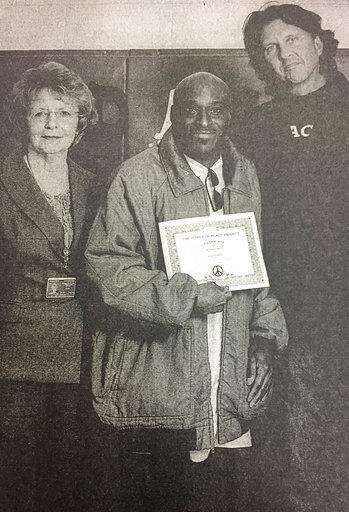
In this 2014 photo provided by the Michigan Department of Corrections, Bobby Hines holds a certificate for his 40 Days of Peace Training Program graduation at the F.C. Brooks and West Shoreline Correctional Facilities in Muskegon Heights, Mich. At left is Warden Mary Berghuis and at right is Kit Cummings, founder of The Power of Peace Project. In his first decade in prison, Hines racked up about a dozen misconduct tickets, many for fighting. But he eventually settled down, comforted by his mother, Gracie. He earned his GED certificate, enrolled in self-improvement programs and developed a reputation as a solid worker in maintenance, kitchen and recreation jobs. (MDOC via AP)
The Associated Press
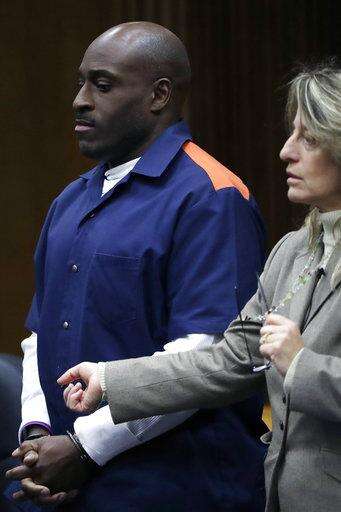
In this Thursday, March 16, 2017 photo, Bobby Hines, with his attorney Valerie Newman, stand before Judge Cynthia Gray Hathaway during a resentencing hearing in Detroit for the 1989 murder of James Warren. "As a man, I take full ownership for what I did," he tells the judge. "I tore their family up, and I didn't even realize what I was doing." (AP Photo/Carlos Osorio)
The Associated Press
In this Thursday, March 16, 2017 image made from video, Henry Carpenter Warren Jr. addresses the court during a resentencing hearing for his son's killer, Bobby Hines, seated left, at the Frank Murphy Hall of Justice in Detroit. Warren says Hines "was punished excessively. ... He can go home today." (AP Photo/Carlos Osorio)
The Associated Press
In this Thursday, March 16, 2017 image from video, Valencia Warren Gibbs, addresses the court during a hearing for her brother's killer, Bobby Hines, at the Frank Murphy Hall of Justice in Detroit. Gibbs and family have forgiven Hines for the murder of her brother, James Warren. (AP Photo/Carlos Osorio)
The Associated Press
In this Thursday, March 16, 2017 photo, Valencia Warren Gibbs, standing next to her father, Henry Carpenter Warren Jr., speaks to reporters at the Frank Murphy Hall of Justice in Detroit. Gibbs and her family have forgiven Bobby Hines for the 1989 murder of her brother, James Warren. "He was 15 years old," she said during Hines' resentencing hearing. "I forgave him the day that it happened. ... I want him to be out. I want him to give himself a chance that he didn't give himself ... that day." (AP Photo/Carlos Osorio)
The Associated Press
This combination of photos from the Lawrence County Alabama Sheriff's Office and the Alabama Department of Corrections shows Evan Miller on Nov. 4, 2005 and later. Miller was convicted at the age of 14 for the 2003 murder of Cole Cannon. (Lawrence County Alabama Sheriff's Office, Alabama Department of Corrections/The Decatur Daily via AP)
The Associated Press
In this Oct. 20, 2006 photo, Evan Miller, right, is escorted to the Lawrence County Courthouse in Moulton, Ala. Miller and another teen beat Cole Cannon with a baseball bat before setting fire to Cannon's trailer with him inside. At a resentencing hearing in March 2017, Miller's lawyers cited his childhood of physical abuse and neglect and argued that at 14, his brain wasn't fully developed. The prosecution said his actions were those of an adult who acted mercilessly. (The Decatur Daily via AP)
The Associated Press
Candy Cheatham, daughter of murder victim Cole Cannon, holds a photo of him in Decatur, Ala., on Tuesday, July 18, 2017. At a March 2017 resentencing hearing, Evan Miller apologized to Cannon's family, but the victim's daughter, Cheatham, rejected that as insincere, "empty words." She testified of nightmares and despair. "To bring this up and make the victims' families relive this, that's being cruel and unusual," she says. (AP Photo/Butch Dill)
The Associated Press
Candy Cheatham, daughter of murder victim Cole Cannon, sits for a photo in Decatur, Ala., on Tuesday, July 18, 2017. At a March 2017 resentencing hearing, Evan Miller apologized to Cannon's family, but the victim's daughter, Cheatham, rejected that as insincere, "empty words." She testified of nightmares and despair. "To bring this up and make the victims' families relive this, that's being cruel and unusual," she says. (AP Photo/Butch Dill)
The Associated Press
In this March 15, 2017 photo, Evan Miller, foreground, is escorted to the Lawrence County Courthouse in Moulton, Ala. Miller was convicted at the age of 14 for the 2003 murder of Cole Cannon. At the resentencing hearing, Miller's lawyers cited his childhood of physical abuse and neglect and argued that at 14, his brain wasn't fully developed. The prosecution said his actions were those of an adult who acted mercilessly. (John Godbey/The Decatur Daily via AP)
The Associated Press
In this Wednesday, March 15, 2017 photo, Oakland County Prosecuting Attorney Jessica Cooper speaks during an interview in her office next to her statue of "Lady Justice" in Pontiac, Mich. Cooper argues that all her juvenile lifer cases are rare since they comprise just a small portion of all the criminal cases her office has handled over many years. She is seeking new natural life sentences in 44 of 49 of the county's juvenile lifer cases. (AP Photo/Carlos Osorio)
The Associated Press
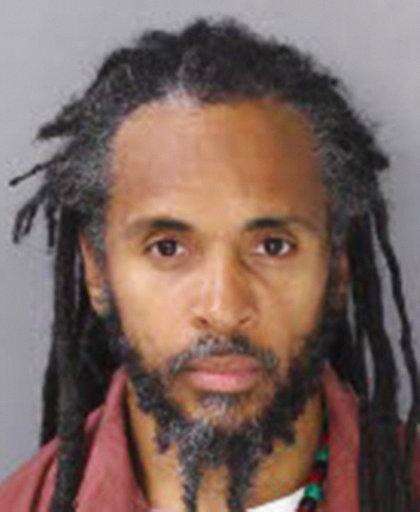
This undated photo provided by the Pennsylvania Department of Corrections in July 2017 shows Kempis Songster. He was a 15-year-old runaway when he joined another teen in the 1987 Philadelphia drug house stabbing of 17-year-old Anjo Pryce, a fellow gang member. At trial, Songster turned down a prosecutor's offer that would have likely seen him do eight to 10 years in prison. "I think they were the youngest guys I ever prosecuted for murder. You walk in there and see that they're children and you say, 'Wait a minute,'" says Jack McMahon, who offered the long-ago plea deal and chalks up Songster's refusal to youthful bravado. Now a defense attorney, McMahon had offered to testify for him. (Pennsylvania Department of Corrections via AP)
The Associated Press
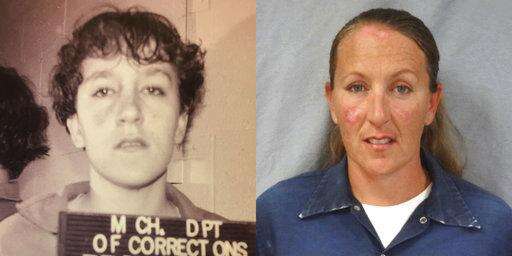
This combination of photos made available by the Michigan Department of Corrections shows Jennifer M. Pruitt in 1993 and in July 2013. In 1993 she targeted her 75-year-old neighbor for robbery and then stood by as an accomplice stabbed Elmer Heichel to death. When Pruitt got life without parole at the age of 17, the law provided only one other choice for punishment _ sentencing Pruitt as a juvenile, which meant just three years of court supervision. (MDOC via AP)
The Associated Press
In this circa 2007 photo from the Michigan Department of Corrections, Jennifer Pruitt celebrates her graduation from a career tech class at the Robert Scott Correctional Facility in Plymouth, Mich. (Michigan Department of Corrections/Robyn Frankel via AP)
The Associated Press
This 2010 photo shows Judge Fred Mester in Waterford, Mich. In 2016, the former judge, who imposed Jennifer Pruitt's life-without-parole sentence in 1993, visited her in prison, saying he found "a new person." He wrote letters to the prosecutor and a new judge, praising Pruitt for pursuing an education, tutoring others and counseling fellow inmates. (Charles V. Tines/Detroit News via AP)
The Associated Press
This combination of photos made available by the Michigan Department of Corrections shows a younger Ahmad Rashad Williams and in April 2014. Williams' mother, a crack addict, died when he was 10. His grandmother, who raised him in Grand Rapids, Mich., died soon after. By the time Williams shot and killed Derek Pimpleton in a dispute over marijuana, he was smoking it every day and regularly skipping school. Both boys were 15. (MDOC via AP)
The Associated Press
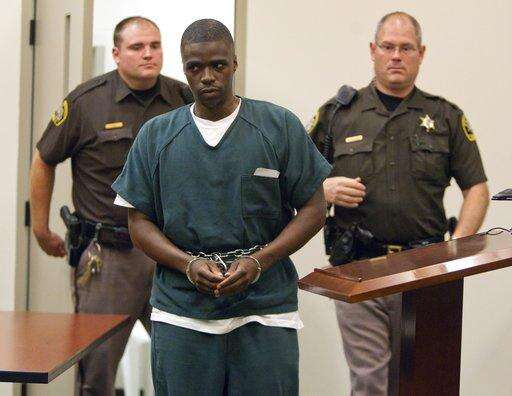
In this Friday, Sept. 30, 2016 photo, Ahmad Williams, center, appears for his resentencing hearing at the Kent County Courthouse in Grand Rapids, Mich. Williams was convicted in the 1988 fatal shooting of Derrick Pimpleton. "I didn't think for myself. I was basically a follower," Williams said from prison. He wanted to imitate older guys who took and sold drugs in his neighborhood, he said, because "I thought that was fun. ... I was doing what I thought a regular 15 year old would do." (Cory Morse/The Grand Rapids Press via AP)
The Associated Press
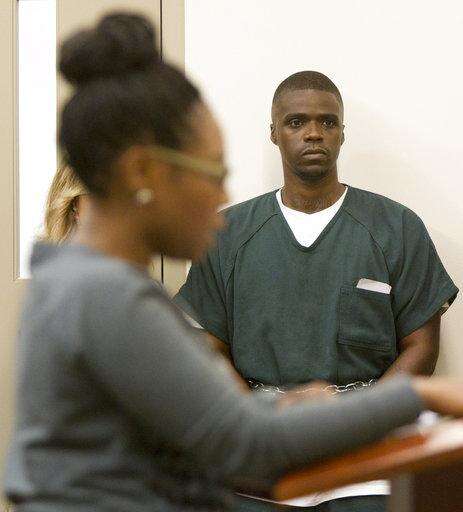
In this Friday, Sept. 30, 2016 photo, Ahmad Williams listens as Danneka Cooper, the sister of Derrick Pimpleton, gives a victim's statement during Williams' resentencing hearing at the Kent County Courthouse in Grand Rapids, Mich. Cooper testified that 18 years wasn't enough time to make up for her family's loss. "He broke my mother's heart," she said. Williams, who was 15 at the time of the killing, apologized. His new sentence makes him eligible for parole in 2024. (Cory Morse/The Grand Rapids Press via AP)
The Associated Press